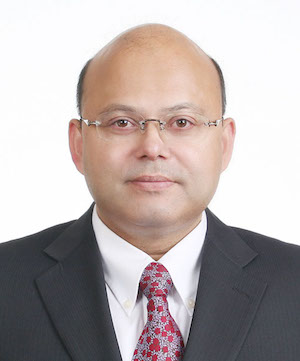 Syed Nasir Ershad
Syed Nasir Ershad
Economic Minister
Embassy of Bangladesh in Tokyo
Public Policy Program (’02)
Please tell us about your career path so far. What is your area of specialization and how did you come to work in this area?
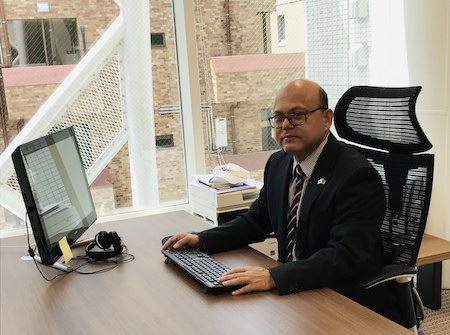
Ershad at work
I have been in the civil service of Bangladesh for more than 25 years. Joining as an Assistant Commissioner and Magistrate in 1995, I have had the opportunity to serve in various ministries, departments and organizations in different capacities both at home and abroad. At the initial stage, my assignment started in the field administration where I was able to reside and work in many parts of my country. As a civil servant there I used to look after a number of issues including land revenue & administration, development programs, law & order, etc. After a few years I was posted in the central government where my first posting was in the Ministry of Finance. That started to build my career centering the fiscal policy of the Government. I became involved in the process of national budget formulation which I found quite intriguing. Even though I cannot claim that I have become specialized per se, but as far as my involvement with financial issues is concerned perhaps it was a combination of luck and the fact that my basic education was in economics. The major part of my career was spent in the ministries; however I have also worked on lien with a project to enhance the skills of the workforce of Bangladesh with a view to increasing the productivity and economic development of the country. I have also had the opportunity to work in the Embassy of Bangladesh in Seoul and now in Tokyo. So, looking at my career it wouldn’t be incorrect to say that perhaps I am jack of all trades but master of none.
You are currently serving as Economic Minister at the Bangladesh Embassy in Tokyo. What are your main roles and responsibilities?
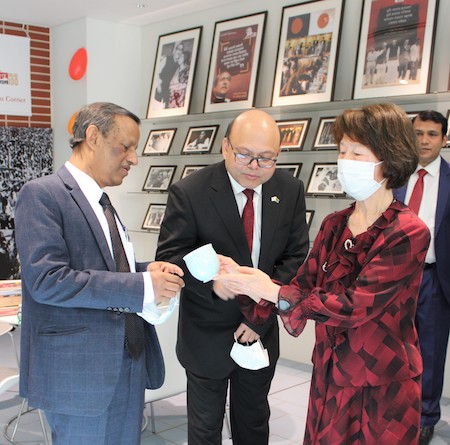
Examining a cultural artifact of Japanese heritage
Recently I have been appointed as the Economic Minister at the Embassy of Bangladesh in Japan, since December 2020. The Economic Wing is charged with the responsibilities of strengthening the existing bilateral economic cooperation between Japan and Bangladesh and for promoting investment by Japanese companies and entrepreneurs in Bangladesh. My team is working on the mobilization of resources, technical cooperation, transfer of technology, human resource development through training & higher education in different Japanese universities & institutions. Major functions include mobilizing bilateral aid from Japan in the form of grants, loans and technical cooperation for Bangladesh. This calls for continuous monitoring of the macro-economic indicators of the Japanese economy the movements of which have implications on the potential ODA flows of Japan. I feel accomplished to facilitate arranging the loan/grant agreements between the Governments of Bangladesh and Japan. It gives me an opportunity to maintain liaison and coordination with key institutions, agencies and relevant ministries of Japan such as Finance, Foreign Affairs, METI, JICA, JBIC, etc. Promoting Japanese investment in Bangladesh is a win-win situation for both the countries. My team also assists strengthening human resource development of Bangladesh through coordinating and assisting Bangladeshi students for Japanese scholarships such as, JDS, MonbukagaKusho, ADB-JSP, JISPA and others.
In your current capacity, what do you see as the main opportunities and challenges for the Japan – Bangladesh relationship over the course of the next five to ten years?
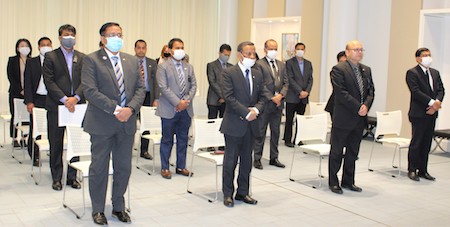
Ershad participating in a national program in the Embassy of Bangladesh in Japan
Japan has been a proven friend of Bangladesh since our independence in 1971. It was one of the first countries to recognize Bangladesh. The diplomatic relationship was established on 10th February 1972. We are planning to celebrate the 50th anniversary – golden jubilee – of the establishment of diplomatic relationship next year 2022 in a befitting manner. With this background I see there is great potential to further strengthen the bilateral relations between Japan and Bangladesh. Japan is already involved with the development process of Bangladesh and it is now growing with every passing year. A number of heavy infrastructure projects including roads and communication, energy and power, ports (both airport and deep sea) are getting ODA support from Japan both in terms of financial and technical assistance. Various Japanese companies are involved there with their technical knowhow and better managerial capacity, which is benefitting both the countries. Whereas Bangladesh is getting quality support from a trusted partner, the Japanese are also getting a high return on their investment. Bangladesh has opened its door to Japanese investors by allocating a special economic zone only for Japanese companies and entrepreneurs. Currently there are about 315 Japanese companies in operation in Bangladesh and the number is growing. In fact, I can only see lots of opportunities, not many challenges as far as Japan-Bangladesh relationship is concerned. Of course, the current COVID-19 pandemic is a hindrance that is limiting our activities in both ends, but that is a global phenomenon. The whole world is struggling to get over it. Hopefully with prudent planning and proper vaccination, both countries and the rest of the world will be able to overcome this challenge sooner.
What are some of the biggest challenges you face in your work? And what have been the most interesting or rewarding aspects of your career thus far?
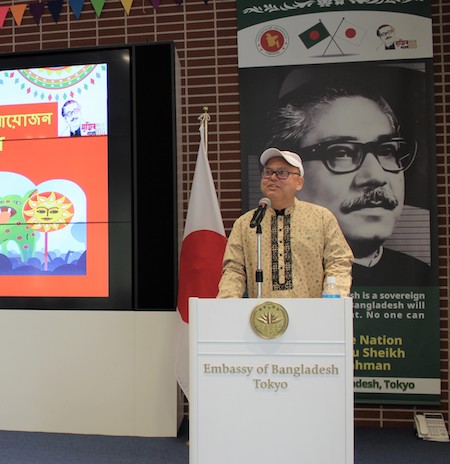
Reciting a patriotic poem in a cultural event of Bangladesh
Since the day I started studying in GRIPS long ago in 2001-02, I am in love with Japan. At this stage of my career I could not have asked for a better posting place than this country. My family and I are quite excited to have been able to come and live here. However, the biggest challenge that I am facing this time is the language barrier. Last time when I came here about twenty years back, I was only a student and the medium of study was English. Moreover there were a lot of foreign students and all of us used to communicate in English. Unfortunately, I did not have enough time and opportunity to learn the language. But now I am here to stay for about four years and I have to deal with the Japanese people and society more extensively. I wish I could interact in Japanese language fluently, that would make my work and life much easier. Because, most of the time man management is the biggest challenge one faces in work and even day to day life.
The most rewarding moments of my career are not personal achievements only. The greatest gratification comes when someone feels that his/her action did make a difference in the lives of others. When we are able to solve problems of a student who is studying here or any citizen of Bangladesh in need of assistance, our joy knows no bound. That is the biggest reward if and when we are able to help others. Also one gets intrigued with the work if one likes to do it. When I was working with the budget team in the Ministry of Finance, we had to work for months together without break for the formulation of the national budget. All the hard work seemed worthwhile when the budget was passed by the national assembly.
What led you to GRIPS? What is the most important thing you got out of your studies here, and how has your experience at GRIPS prepared you for future endeavours?
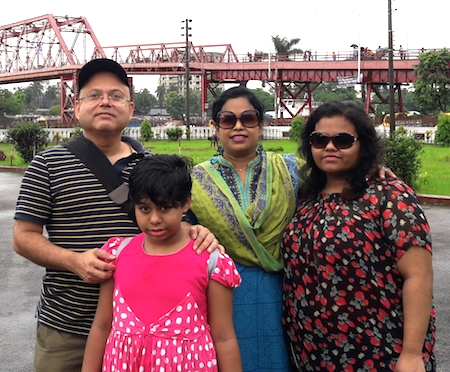
Family is the most important thing in life to hold onself together
I was in my sixth year of government service when I came to GRIPS for studying a Master in Public Policy. Being a civil servant it was quite pertinent for me to pursue knowledge in that area. Fortunately I came to know about GRIPS from an advertisement circulating in the Bangladesh government. I applied and eventually got selected to pursue my studies here. For a number of reasons I feel lucky that I got to study here. First of all, the facilities were wonderful. Secondly, the faculty was so rich. We were taught by some of the best teachers in my life in GRIPS. This institute also offered an opportunity to study along with civil servants, professionals and academics of many countries together. So, we could share the pooled knowledge and experience of a global stature. This experience certainly helped me mould my career in a positive manner which was useful in all my future endeavors. It would not be an exaggeration to say that perhaps the reason that I have come back to Japan to serve in my country’s Embassy here is also because of my previous experience at GRIPS.
What are some of the fondest memories of your time spent at GRIPS?
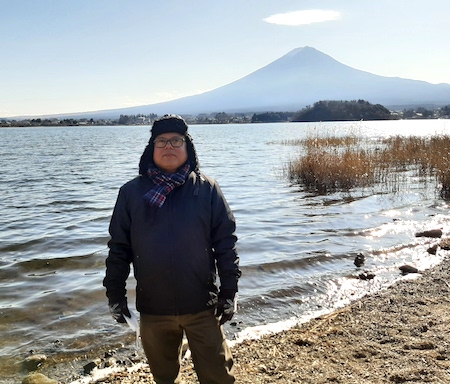
Lake Kawaguchiko and Mt Fuji
All the memories in GRIPS are very dear to me. Obviously the study in public policy helped me gain knowledge and experience, which has added professional value to my career. In addition many of the friendships with the Japanese peers and also colleagues from other countries proved to be long lasting and quite precious. One of the memories that I remember fondly is the trip to Okinawa that we had to win through a test taken by professors. It was quite interesting to spend about one week’s time away from the hustle and bustle of the capital among a number of friends and a few Japanese professors and staff. The local cultural experience and delicious food are something we will never be able to forget. I also still remember that I was elected a member of the International Student Council in GRIPS. Another fond memory is the opportunity that was given to me by the university to deliver the valedictory speech at the graduation ceremony. I felt quite thrilled and honored to speak on behalf of the students in front of all the fellow students (both foreign and Japanese) and also the President, faculty and all the staffs of GRIPS.
What do you miss about Bangladesh and what do you like most about living in Tokyo? How has Tokyo changed since you completed the Public Policy Program at GRIPS in 2002?
Wherever I go in the world, I always carry a piece of Bangladesh deep down in my little heart. I miss my relatives, friends, food. Sometimes, suffering from nostalgia I even miss the notorious traffic jam of Dhaka (not really). On the other hand Tokyo is so neat and clean, systems work smoothly, people are so calm and gentle that sometimes it feels like next to heaven. Another thing is food. Many people of Bangladesh when they visit here complain about not being able to eat anything properly because of different cuisine habit and taste. Not me. I like Japanese food a lot. In fact my family, especially my daughter, is very fond of sushi and other foods here.
Tokyo hasn’t changed much since I lived here in 2001-02. That time I was staying as a student and life was more carefree, except for the exams. But now I have responsibilities bigger than 20 years ago, obviously. And I have more opportunities to interact with the Japanese people and society. However, I can feel the same old Tokyo in my heart.
How do you maintain a balance between your work and the rest of your life? And what is your favorite thing to do when you are not working?
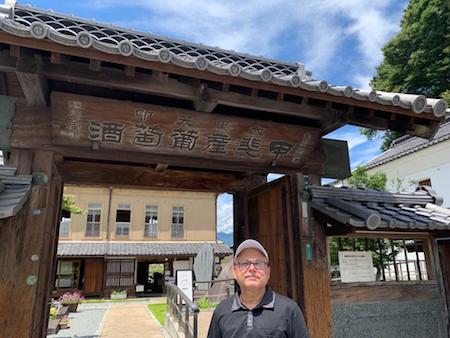
Visiting culltural spots in Yamanashi prefecture of Japan
In my opinion I am not a very organized person. Sometimes it becomes difficult for me to separate my work life from my personal life (which is not good). However, I try to spend time with my family whenever I am not working. As a family we like to travel whenever we have the opportunity. It doesn’t always have to be an expensive trip to far away destinations. Sometimes a short trip here and there can amazingly refresh our mind.
If you could give one piece of advice to anyone considering studying at GRIPS what would it be?
“Go study in GRIPS, it will help materialize your dreams”.
How would you like to maintain involved with the School? What do you expect from GRIPS as an alumnus and do you have any suggestions on how to further utilize the GRIPS alumni network?
GRIPS is my favourite alma mater. I am willing to remain involved with it all my life in any way possible. I can teach here, share my life experiences, hold seminars for the students, or do anything else meaningful.
I feel honoured to be an alumnus of GRIPS. All I want is that GRIPS never forgets me and reaches out to me if I can be of any assistance in my humble way.
The GRIPS alumni network is a rich forum with many important persons and great minds all over the world. In this diversified world each of us are going through different experiences at work and whatever endeavors we are undertaking. The GRIPS alumni network could be made more interactive whereby we should be able to share our thoughts, ideas and experiences for the greater benefit of each and all. We should be able to further utilize this network’s potential to hone more productivity out of the individuals for the advantage of our respective societies and countries.





